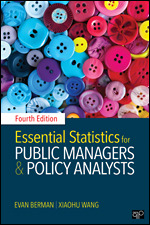Essential Statistics for Public Managers and Policy Analysts
- Evan Berman - Fundação Getulio Vargas, Brazil, Victoria University of Wellington, New Zealand, Fundação Getulio Vargas’s Sao Paulo School of Business Administration, Brazil
- Xiaohu Wang - City University of Hong Kong, Hong Kong
Public Management
Known for its brevity and student-friendly approach, Essential Statistics for Public Managers and Policy Analysts remains one of the most popular introductory books on statistics for public policy and public administration students, using carefully selected examples tailored specifically for them. The Fourth Edition continues to offer a conceptual understanding of statistics that can be applied readily to the real-life challenges of public administrators and policy analysts. The book provides examples from the areas of human resources management, organizational behavior, budgeting, and public policy to illustrate how public administrators interact with and analyze data.
The text may be paired with the workbook Exercising Essential Statistics, Fourth Edition to help students apply each statistical technique introduced in the text. Click here to see more information about the workbook. Use bundle ISBN: 978-1-5063-7366-9.Available with Perusall—an eBook that makes it easier to prepare for class
Perusall is an award-winning eBook platform featuring social annotation tools that allow students and instructors to collaboratively mark up and discuss their SAGE textbook. Backed by research and supported by technological innovations developed at Harvard University, this process of learning through collaborative annotation keeps your students engaged and makes teaching easier and more effective. Learn more.
Supplements
Password-protected Instructor Resources include the following:
- Sample course syllabi for semester and quarter courses provide suggested models for structuring one’s course.
- A set of all the graphics from the text, including all of the maps, tables, and figures, in PowerPoint, .pdf, and .jpg formats for class presentations.
- A Microsoft® Word test bank, is available containing multiple choice, true/false, short answer, and essay questions for each chapter. The test bank provides you with a diverse range of pre-written options as well as the opportunity for editing any question and/or inserting your own personalized questions to effectively assess students’ progress and understanding.
- Editable, chapter-specific Microsoft® PowerPoint® slides offer you complete flexibility in easily creating a multimedia presentation for your course. Highlight essential content and features.
- And much more!
affordability, conciseness, relevance to professional work.


